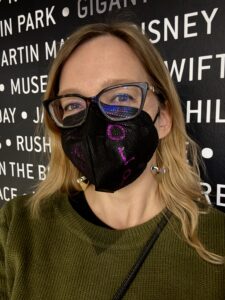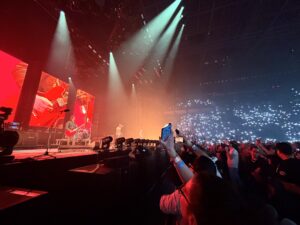Our Lady Peace’s “Waited”
I’ve reached the age when bands I adored in my budding youth have started celebrating the kinds of protracted milestones that glaringly underscore how much time has passed between then and now. Anniversary tours abound. Such was the case last year when Sarah McLachlan toured her 1993 album Ecstasy, marking 30-ish years since its release, and this year it’s alt-rock band Our Lady Peace commemorating their legacy with the OLP30 tour.
If nostalgia, as a feeling, grows more downy as it deepens over time, then Our Lady Peace would be a kind of nestling place for me. As a freshman, I found a relatable mirror for my angst in the band’s 1999 album Happiness…Is Not a Fish That You Can Catch. There was something in lead singer Raine Maida’s acerbic yet aching vocals and drummer Jeremy Taggart’s dense yet deft fills that caught my reflection at the time.
Happiness teems with disillusionment, picking up on the “rampant near-nihilism of kids today,” former lead guitarist Mike Turner told the Ottawa Sun at the time. As the sunset of the twentieth century flared at the horizon point, “millennial malaise” had grown furious, evidenced by the scarring turn Woodstock ’99 took compared to its peace-and-love predecessor. Even if you didn’t live it yourself, rage crackled in the air. Being both younger and a girl, I couldn’t understand how to access my very real but very veiled anger. OLP made it possible—the music excavated the emotion.
Last year, I out-and-out squealed when I saw the OLP30 announcement. To make the tour more enticing, Wintersleep, one of my current Canadian faves, would be opening on certain stops. I’d just left Toronto and planned on laying low for some time, but surely here was a reason to go back to Canada for a visit.

I splurged on a surprisingly inexpensive front-row ticket to the Montreal show. Before I developed long covid, I never minded going to concerts solo, but there’s something about masking at a time when few practice that safety and attending things alone that feels seismically vulnerable. A front-row ticket can be a kind of buffer, while providing more space than I’d find, say, in the middle of a section. (These are things we in the covid-safe community think about when attending shows. It’s all aisle seats, front row, or back of the room.) I also DIY’d my mask to read “OLP” in glitter so I didn’t get as many dirty looks since people really do not like it when you make different choices than them.
Thinking I’d take advantage of the city’s culture and get a chance to practice my French, I drove up two days early. Instead, I ended up resting in my hotel room nearly the entire time. Even then, I wasn’t sure I’d have the stamina to make it through the full show. As I tend to do these days, I set time limits on events. I planned on trying to stay for the first handful of songs, maybe five, and then dipping if I felt like it was getting to be too much.
See, concerts have been a hit-or-miss affair for me. Something about the light/sound combo proves to be overly stimulating for a dysautonomic body fraught by an energy-limiting illness. Let’s just say, it has not gone well in the past. Still, I keep trying. I’ve relinquished so much about my past abled-body life, but not this. I refuse to let long covid steal live music, too.
Lucky me, somehow I made it through the whole thing. Standing! All four songs of the encore to boot. It was marvelous. A lifeline. (Although I did later pay for the energy demands of the evening.) Ahead of the show, the band asked fans—via a QR code—which song they should play for an encore: “Automatic Flowers” or “Waited.” Without hesitation, I submitted my vote for “Waited,” my absolute favorite track from Happiness, and possibly the song I love best from OLP. But the crowd wanted AF, and so AF we got. What a missed opportunity.
 The opening guitar riff of “Waited” feels ponderous, reflecting the turmoil of pseudo-friendship the song recounts. Taggart delivers a soft drumroll that lands directly at Maida’s feet as he begins mulling over a connection he thought he could count on. “Hit the ground/ Weighed down again/ You walked out/ But I’m sure you’re my friend,” he sings sedately.
The opening guitar riff of “Waited” feels ponderous, reflecting the turmoil of pseudo-friendship the song recounts. Taggart delivers a soft drumroll that lands directly at Maida’s feet as he begins mulling over a connection he thought he could count on. “Hit the ground/ Weighed down again/ You walked out/ But I’m sure you’re my friend,” he sings sedately.
Where the verses are restrained, almost as if in holding back his true feelings Maida can change his friend’s mind by reeling in the roiling needs that may have provoked distance in the first place, the chorus explodes. Each instance of it refracts the mounting tension of a soured friendship.
Taggart’s drumming elevates the song and is what my ears usually gravitate to when I play it. On the verses, he drums in a skipping, double-dutch quality, almost hearkening back to the playgrounds of yore where nascent friendships first find their footing. But he nimbly shifts into a more sinewy rhythm on the chorus. The true distress in the song is centered there in his force. The way Taggart matches Maida’s anthemic vocals, weight for weight, near the end of the song always delivers such a thrill.
While I didn’t get to hear “Waited” played live, simply reveling in OLP’s music once more and connecting with that 14-year-old girl who first set me on a path to land at the band’s anniversary concert some 26 years later felt like a small piece of magic. The way time can unfurl the unexpected and remind you there’s more story left to write.




